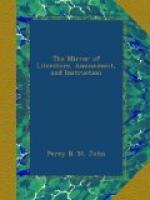Fitz-Stephen says, “Thomas a Becket lived in such splendour, that besides having silver bits to his horses, he had such numerous guests at his banquets, that he was obliged to have rooms covered with clean hay or straw, in winter, and green boughs or rushes in summer, every day, lest his guests, not finding seats at his tables, should soil their gay clothes by sitting on the floor.” He would pay five pounds (equal nearly to fifty pounds of our money) for a single dish of eels. Once riding through London with Henry, the King seeing a wretched, shivering beggar, “It would be a good deed (said he) to give that poor wretch a coat.” “True, (said Becket.) and you, sir, may let him have yours.” “He shall have yours” said Henry, and after a heavy scuffle, in which they had nearly dismounted each other, Becket proved the weakest, and his coat was allotted to the astonished mendicant.
“When William the Conqueror was crowned at Westminster, the people (says Andrews) within the Abbey shouted, on the crown being placed on his head, the Normans without, thought the noise a signal of revolt, and began to set fire to houses, and massacre the populace, nor were they satisfied that all was well until considerable mischief had been done.”
“Dr. Henry, (says Sulivan) who has made a very full collection of the facts mentioned by ancient authors, concerning the provincial government of Britain, supposes its annual revenue amounted to no less than two millions sterling; a sum nearly as great as that which was derived from Egypt, in the time of the father of Cleopatra. But this calculation is built upon the authority of Lipsius. Nor are there perhaps any accounts transmitted by historians, from which the point can be accurately determined. The Britons excelled in agriculture. They exported great quantities of corn, for supplying the armies in other parts of the empire. They had linen and woollen manufactures; as their mines of lead and tin were inexhaustible. And further we know, that Britain, in consequence of her supposed resources, was sometimes reduced to such distress, by the demands of government, as to be obliged to borrow money at an exorbitant interest. In this trade, the best citizens of Rome were not ashamed to engage; and, though prohibited by law, Seneca, whose philosophy, it seems, was not incompatible with the love of money, lent the Britons at one time above three hundred and twenty thousand pounds.”
P.T.W.
* * * * *
HINTS ON DRINKING.
Abridged from Mr. Richards’s Treatise on Nervous Disorders.




